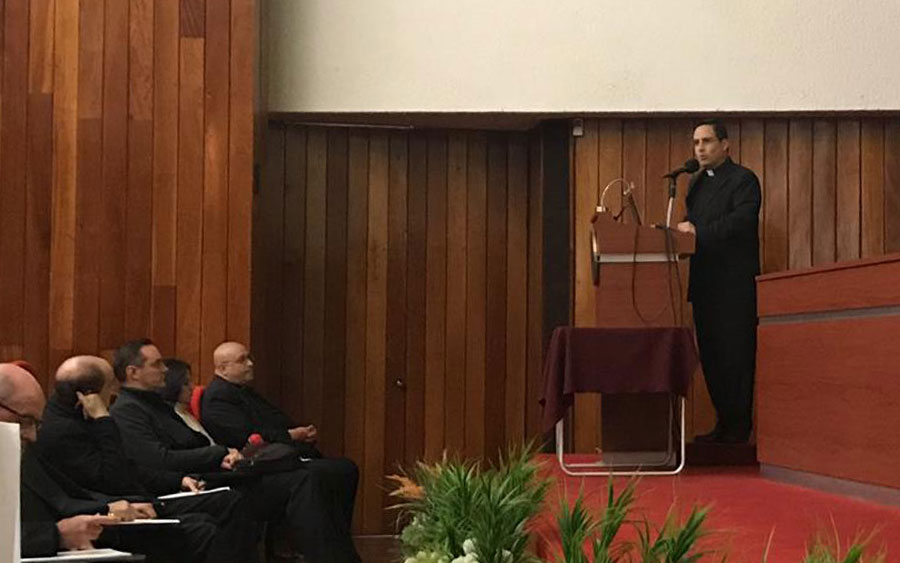Safe environments. A concept that resonates mainly in the hearts of families and institutions after discovering how children around the world have been physically, psychologically, and sexually abused. What does the Legion of Christ think about the topic of safe environments?
I believe that not only have we realized that many children worldwide have suffered this type of abuse, but today we have a better understanding of the impact and harm it causes to those who have suffered it and how the process of healing is long and very difficult. Its effect on victims is devastating. This impact is even greater when the perpetrator is a priest or religious. Because someone who should bring people closer to God, instead, confuses, disillusions, and betrays the victim’s trust, as well as that of their families and society in general, showing a false face of God and distancing souls from Him.
Today in the Legion we know that Safe Environments touch the very core of our mission and ministry as priests, called to bring each person closer to God. We are aware of the immense need for Christ that young people have today. Providing them with a safe environment is an essential need.
We must acknowledge that there are people who in the past have suffered abuse by members of our Congregation’s priests and religious, and we did not always respond well to them. We know that nothing is more contrary to our responsibility to evangelize than damaging the dignity of persons, and therefore we must live in a constant attitude of conversion, as Pope Francis requests, to sincerely commit ourselves to the protection of minors and vulnerable adults.
What has been done during this recent period of governance to make the prevention of abuse of minors and the response to reports a priority among Legion of Christ members?
From the general leadership, we have promoted the implementation of our Safe Environments standards, which are divided into three main groups: prevention, response, and supervision.
Prevention because we do not want these abuses to recur in our institution, and we must employ all means at our disposal to prevent them. Among the measures we apply are the selection process for entry into our Congregation, the human, affective, and psychosexual formation of our religious, the codes of conduct (recently updated), as well as the care and attention in the ongoing formation of our priests.
Response because we want to address any report or complaint. We know that for a victim, this is the beginning of their healing process. This includes not only attending to reports but also providing the necessary pastoral care to contribute to the healing of those who have suffered abuse.
Supervision because we have the duty to accompany Legion members who have committed faults in this area, helping them understand their responsibility when exposing themselves to risks or the harm caused, and preventing them from continuing to do so.
All territories (provinces) that do not have a local institution certifying compliance with these safe environment policies are starting or are about to start external audits, mostly by Praesidium Inc, a reference institution in the United States, to evaluate the implementation of abuse prevention policies and rapid response.
In June 2018, our general director emphasized to territorial directors and safe environment coordinators the importance of raising awareness and promoting a true culture of safe environments among all Legion members.
In countries where specific training on sexual abuse against minors, requested by bishops or the State, has not been provided, the general leadership, with the support of institutions like Reparare, a research center on sexual abuse at the Universidad Anáhuac, has provided training to nearly 300 Legion members.
At the beginning of 2019, we announced an update to our safe environment standards, resulting from ongoing reflection to improve our prevention, response, and supervision. Specifically, each territorial government has been asked to establish an independent reporting channel, in addition to the institutional one. This aims to facilitate the approach of any victim. We also shared some guidelines for pastoral care for victims and those reporting sexual abuse.
Pope Francis is meeting with presidents of episcopal conferences worldwide to analyze the issue of preventing abuse of minors and vulnerable adults, as it involves the entire Church. Without aiming for an exhaustive analysis, how have you seen the response/participation of Legion members regarding abuse prevention in the pastoral programs they lead?
I believe most Legion members understand the scope of the problem and the need for all of us to commit to making the Church a safe home. There is a sincere desire to listen and learn how to work together to solve the problem. This has required each Legionary to undertake hard work to comply with and document the safe environment standards, which require a cultural change to ensure the means of knowledge, supervision, and preparation that, until a few years ago, were not common in most countries worldwide, both at the state and ecclesial levels.
Why should a parent trust that abuse will not occur in the Institution?
To be trustworthy, one must commit and fulfill. And that is what we are doing: we have committed ourselves to prevention by applying our safe environment policy and certifying it through an independent certifier. We also respond quickly and unequivocally if a report is made. This means that the most important thing is prevention—ensuring that abuses never happen. If an abuse does occur, the most important thing is to act decisively, unequivocally, appropriately, and professionally. Welcome the victim with compassion, hand over the facts to the competent authorities for clarification, and request an external audit to ensure that the steps we take are appropriate.
We can never guarantee that such an incident will not happen. But we can commit and do everything possible to make it as difficult as possible, so that no one with such intentions feels comfortable in our works, and so that any educational environment under the Legion of Christ is a place where no one with the intent to abuse a minor would want to be. And if it happens somewhere, we will act with all the consequences.
If a serious accusation involving a member of the Legion of Christ arises somewhere, what happens?
The first step is to listen and support the person reporting, offering the pastoral, psychological, and human help they need and that we can provide at that moment. It is also necessary, according to the laws of different countries and the severity of each case, to inform the relevant civil and ecclesiastical authorities, while also informing the accused of the complaint against them. For prudence, precautionary measures are applied to the accused to prevent further harm to the potential victim or other possible victims, without necessarily implying guilt. This is to facilitate the preliminary investigation provided for by the Code of Canon Law (can. 1717), always in accordance with civil laws regarding these processes. The accused must be judged by civil justice, like any citizen, and also by ecclesiastical justice—by virtue of being a religious.
What prospects are there for 2019 regarding safe environments?
We aim for all our territories to receive accreditation from an external, independent agency confirming they meet the safe environment standards. Where we have already achieved this, such as in Spain and the United States, this certification process has helped us apply our policies more seriously and professionally. Achieving this is a demanding task that will require dedication from everyone involved throughout the year.
Additionally, we will continue analyzing the best ways to respond to and reach out to those who, before the approval of our safe environment policies in 2015, suffered abuse by one of our religious members.
We will also incorporate what the Church indicates as a result of the Pope’s meetings with episcopal conference presidents and superiors to make necessary adjustments to our procedures.
If someone wants to make a report of abuse or share something related to such acts, whom should they contact to be heard?
In each country where we work, there is a reporting channel that includes emails and phone numbers. It is published on our websites. In a few months, each territory will add a new reporting channel managed by an independent entity to facilitate the process for those who need to be heard and attended to.
We also have an email available at the general office: childprotection@legionaries.org
The recent history of the Legionaries of Christ has been seriously affected by the discovery of the founder’s double life. How does this knowledge and experience influence how the Legion addresses the issue of sexual abuse today? Do you see a special responsibility?
We have a great responsibility. We live firsthand the tragedy and immense pain that sexual abuse causes—not only to the victim but also to everyone affected in some way by the abuser’s actions. The testimonies of survivors of child abuse are very eloquent and help us take seriously our commitment to prevent this from happening again. Asking forgiveness from a victim, as we have done and will continue to do, requires a sincere commitment to them so that this history does not repeat itself.
We cannot stop learning from our history and, therefore, from continuing on a path of constant conversion and demand. It has required us to engage in the field of safe environments in various ways for years, as I mentioned earlier, applying demanding policies of prevention and response. Our challenge is to turn these into a true culture of child protection.
Current scientific studies in several countries show that sexual abuse within the Catholic Church has systemic causes. Pope Francis himself spoke about the problem of “clericalism.” Based on your experience, what are the systemic reasons one must face? What is then important in terms of prevention from a systemic perspective?
The fear of scandal along with the fear of “what if…” has been present, and perhaps we have forgotten that the truth, as the Lord teaches us in the Gospel, will set us free. In this regard, the work done by Father Benjamín Clariond for his doctoral thesis reiterates the importance of commitment to the truth above any reputation considerations. I believe his research, which includes a section on the negative influence of clericalism on the credibility of the Church, can provide valid guidance on how to act when facing horrible situations like abuse.
In our history, paternalism towards those who committed these acts has also been present, which did not help them take responsibility or understand the damage caused. This has sometimes been amplified by some religious feeling they have special rights over other faithful just because they are priests, instead of seeing it as what it truly is—a service to others.
On a personal level, I believe we must remember that although we are priests, we are still men, and we must learn to listen to ourselves, detect our vulnerabilities, and address them properly.
We have worked and will continue working on each of these points to face the necessary cultural change.
Effective prevention measures are expected from the Church. How do you prepare the seminarians of the Congregation during their formation to be future priests? Does this affect the image of the priest that the formators transmit?
We have sought more earnestly to make the human formation of future priests more comprehensive and profound, based on a better self-knowledge and inner freedom that allows them to act coherently. These elements are essential to see who is suitable for the priesthood. These same requirements have been incorporated into our accreditation standards to ensure compliance, which is our responsibility before the entire Church.
But moreover, the protection of minors is an essential premise of our ministry. We must educate in listening to be able to respond and welcome anyone who might be at risk of suffering abuse. I believe today’s seminarian generations face the challenge of becoming holier and better-prepared priests, and I am confident they are committed to achieving this.










